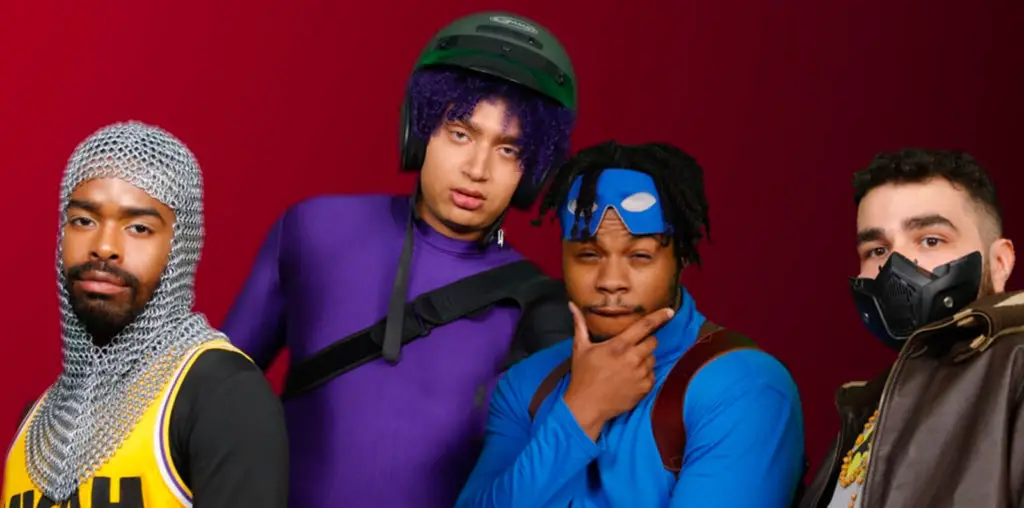
While trying to come up with words to describe Will Ferrell’s new movie, Talladega Nights: The Ballad of Ricky Bobby, I considered the likes of “formulaic,” “played out,” and “they’re charging $9 for this?” I eventually settled on “monotonous,” for while it offers a few precious laughs, Talladega Nights simply apes the look and feel of most recent Ferrell movies. In this one, he plays Ricky Bobby (yes, someone makes the ‘two first names’ joke early on), a dull-witted young man who grows up with dreams of high speed glory. Somehow (we leap from pre-adolescence to adulthood) he gets a job on a NASCAR pit crew, then seizes an unlikely opportunity to become, with the help of fellow driver and best friend Cal (John C. Reilly, earning a quick paycheck), the hottest driver on the circuit. That is, until upstart Frenchman Jean Girard (Sacha Baron Cohen) arrives and sends Bobby into a downward spiral, from which only his deadbeat father (Gary Cole) can save him.
Every plot point and gag in Talladega Nights adheres faithfully to the blueprint laid out by over a dozen Adam Sandler (or Ben Stiller, or Ferrell himself) movies that have come before. Bobby is an affable sort who lets success and wealth go this head, which – in the movie world – requires a humiliating smackdown, followed by gradual resurgence and personal growth (in the real world such people are rewarded with discount stock certificates and Cabinet positions). This formula is almost as old as the movies themselves, and the only things today’s generation of comedians bring to the table are a heightened sense of vulgarity and occasional quasi-surrealistic touch (here, it’s the debate over everyone’s favorite incarnation of Jesus).
Ferrell may have been an inspired performer on Saturday Night Live, but he’s become increasingly one-note in his recent roles, each of which (and especially in Bewitched and Kicking and Screaming) has been an interchangeable variation on the somewhat dim or slightly clueless Everyman. Luckily for the producers of Talladega Nights, droningly repetitive performances won’t put off stock car racing fans, who sit through four hours of one of the most tedious so-called “sports” on earth every week. The movie will likely be over before they even have time to jot down all of the sponsors on Bobby’s car.
Which reminds me, Hollywood must crap itself in delight every time another NASCAR movie comes along. How else could they have an excuse to fill up two-thirds of the screen with a car hood bearing the Wonder Bread logo and slap product endorsements all over their actors? Talladega Nights is incontrovertible proof that the studios have all the integrity of a Bangkok streetwalker while the 7th Fleet’s in town. This isn’t a movie, it’s an infomercial, and one with an honest-to-god Applebee’s commercial that airs during the movie itself. Looks like Sony has finally figured out how to circumvent all that criticism about ads playing before the movie; simply play them after it’s started
A more ambitious effort would have utilized Ferrell’s ubiquitous George W. Bush imitation and Cohen’s smug yet sensitive Frenchman (which is a much more realized character than one would assume) to greater effect; perhaps as a commentary on our country’s current status (or lack thereof) overseas, or an observation about America’s obsession with conspicuous consumption. But then we’d have something called “satire,” and that doesn’t happen passively. At the very least, screenwriters Ferrell and Adam McKay needed to put more effort into the story than repetitive “baby Jesus” jokes and having Ferrell holler a lot…again. Or run around in his underwear…again.
You’re also going to hear a lot about how Talladega Nights is getting laughs at NASCAR’s expense, or that it pokes fun at the sport and its fans. Don’t believe it. NASCAR never would’ve given McKay and company sanction to use its logo, its drivers (Dale Jr. makes a cameo), or its announcers if there existed the slightest chance that something truly critical would make it up screen. Bobby and his family/friends are the only idiots in this movie, making it seem like all racing fans are cultured sophisticates by comparison.
Talladega Nights isn’t very funny, which is a problem for a movie billing itself as a comedy, but it is lazy, which is far worse. Ferrell and McKay apparently felt that “NASCAR + redneck ‘Frank the Tank’” was a concept worthy to shake the foundations of humor heaven. Whether or not this is true is something we’ll never know because no one bothered to write a decent script, relying instead on things like a mincing Andy Richter, Farrell’s amiable obliviousness, and a character named “Terry Cheveaux.” Talladega Nights provides a few laughs, mostly when Cole or Cohen is on screen, but it ultimately serves two purposes: continuing the summer-long string of lackluster comedy releases, and allowing Ferrell to earn a huge paycheck while coasting through yet another movie.


I can see where you’re coming from. Talladega Nights definitely follows that same formula we’ve seen a lot from Ferrell, and I agree—it doesn’t hit quite as hard as some of his other stuff. Still, I got a few laughs, especially in that scene where Ricky’s getting talked into thinking he’s paralyzed, only to stab himself in the leg. That bit always cracks me up.
One thing I will say is that the ridiculous product placement actually worked on me. After seeing the Wonder Bread logo plastered all over Ricky’s car and jacket, I ended up buying a same looking Wonder Bread jacket from Safyd just for fun. Didn’t expect it, but it’s a great conversation starter at BBQs and parties—people love the reference!